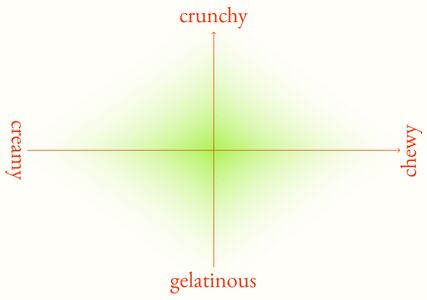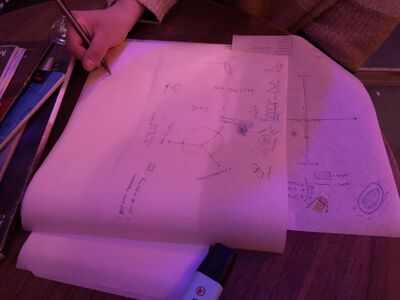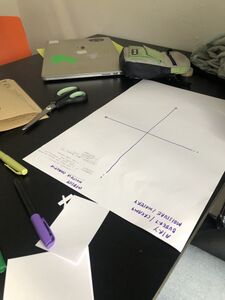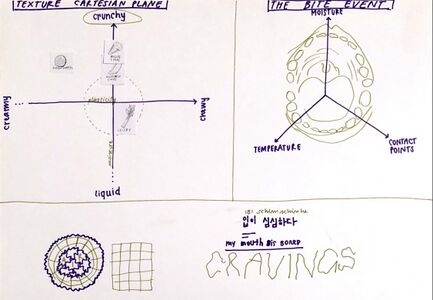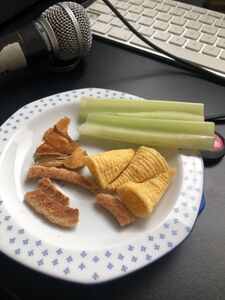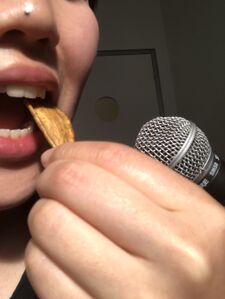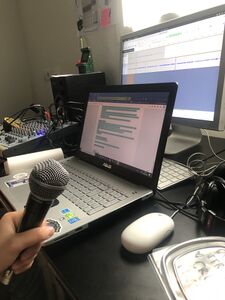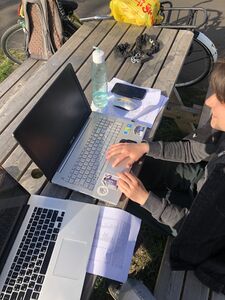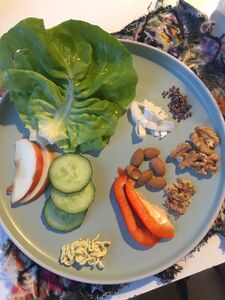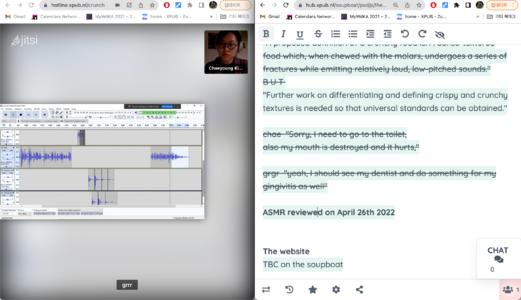SI18 - Radio Implicancies: Difference between revisions
| Line 72: | Line 72: | ||
A jingle board arranged in the layout of a parliament! Each seat is a button that plays an audio snippet when pressed. | A jingle board arranged in the layout of a parliament! Each seat is a button that plays an audio snippet when pressed. | ||
=== #05: Collective writing === | === #05: Collective writing, nested narratives === | ||
https://issue.xpub.nl/18/05/ | https://issue.xpub.nl/18/05/ | ||
Latest revision as of 22:23, 12 December 2022
link to the special issue release page
The Special Issue 18 - Radio Implicancies - "is about practicing interdependencies. About how to stay with the complex entanglements between the personal, the economical, the political and the computational. About thinking, using and making technology with mutual relations in mind."
“Radio Implicancies”, is a series of eight weekly released sound publications. We have been shapeshifting each Tuesday of the week into our own audience and constantly shuffled positions in the overall work infrastructure. This modular approach enabled an interdependent publishing structure in which we all took turns in order to share responsibilities in a sustainable manner.
Every week 3-4 caretakers would invite the rest of the group to elaborate and contribute to the weekly publication on a specific topic, or format or keyword. The caretakers would also collect the contributions and assemble them together and be in charge of the listening settings in which we would deep listen the result.
Every other Tuesday of each week, somehow estranged from everyone’s work progress, all the members, except the care-takers (those responsible of the outcome of that week’s publication), would walk into a dedicated room unaware of the experience they would step into.
The publications shifted from edited projects to live performances, presenting tools, interface or instruments for the public to thread all the pieces together themselves. The listener’s experience evolved from that of a brutal unintentional edit of disparate sound-works, to an intentional curated piece, interlaced by a common rhythm: that of different binding sounds.
It follows a small log of each week. See the common documentation page of this special issue on this page
#00: test test
We created microphones with coils and piezos. Did a quick test recording kalimba and Manetta talking in the background
#01: Yet to be named
Contributors: Mitsa and Grgr
Mitsa and I went to Noordplein to discuss what to record, our contribution was a layered talk about how to field record An audio track with parts of mitsa's and erica's conversations, one evening at nordplein. It is composed as two parallel monologues. On the left speaker is mostly erica's voice and on the right side mostly mitsa's. Talking mostly about public space, field recording in public spaces, the position of the one that records and the one that is being recorded, the difference between soundscape and pure library sounds, how to choose what is urgent to be published, while the sounscape of noordplein is present
#02: Uneven patterns
contributors: Chae and Grgr Patterns of crunchiness (to satisfy your bored mouth)
Based on Erica's diagram of crunchiness and other textures of foods, Chae and Grgr decided to initiate crunch research group. As our first activity, we reviewed the academic paper in ASMR format. With an intention to bring the extreme pleasure of academic papers, crunchy essays to pleasure your brain and hunger for knowledge.
Critical_and_Intimate_Evaluation_of_Crunchiness
#03: The emergent opera
caretakers: Gersande, Kamo, Grgr
An emergent opera where each property is part of a bigger whole, that comes together in the becoming...
tools:
- web interface for an emergent opera and interchangeable orchestra director
- web-to-print libretto with pagedjs
#04: The jingle board parliament
caretakers: Miri, Mitsa, Grgr
A jingle board arranged in the layout of a parliament! Each seat is a button that plays an audio snippet when pressed.
#05: Collective writing, nested narratives
contributors: Jian, Grgr
Collective writing through and across folder paths. The result was a collective poem about censorship in art.
As a way to collectively write a text we came up with this method: The starting sentence would be a parent-folder on the soupboat and each of us would add subfolders, sub-sub-folders and so on to continue the sentence while creating new branches.
The folder structure was built using the terminal only.
We then built a python-function that reads through the whole folder structure, starting from the parent-folder and following the different branches to all last children. All paths are written to a text file, using indentation to visualize the hierarchy of the folder structure.
The result is a text file that reads through 55 paths in a poem-like structure. The collective reading of the poem followed no rules except intuition and was recorded.
#06: Sharing methods for diffractive reading
caretakers: Kimberley, Kamo, Grgr
On this day we recorded a "cooking show" in which recipes for reading diffractively were created and interpreted by the group. These recipes, or methods, were prepared in advance, in occasion of an assignment during the same week. Part of the release consisted in a workshop in which we applied the recipes to references and resources of our choice. The results have been performed live at the end.
#07: Unfolding Implicancies
contribution with lyrics from Robert Wyatt's song "Free will and testament"
#08: Outro/Intro: Live in Paris
during the final week of Special Issue 18 we have been hosted by La Générale, a political, social and artistic laboratory in Paris, in which we had the chance to closely work together in a residency for 4 days. It was for us an opportunity to look and reflect retrospectively on the work done so far, to process, analyse and draw a fil rouge in between our weekly releases, and build a collective understanding of the process we went through. The eighth release is thus the result of a wrap up moment; we would like to present it as an outro for ourselves, but also as an introduction that could hopefully guide future listeners across the messy interconnections and implicancies of the Special Issue 18.
some personal reflections
This Special Issue was extremely challenging for me, because I find it difficult to let go of things sometimes. In a sense that I've always been educated in building a severe self-critique on the things I do, and to position them in a crazy competitive environment, with no real reasons. During this time in xpub I'm learning to get rid of this attitude, and although I could never really feel at ease with that, sometimes I still recognize that some remnants of this attitude inevitably persist.
Looking back at the SI18 I can I really appreciate how it put a spotlight and questioned even more deeply my engrained ways of working together with other people, my expectations, and my attention on what can be valued within the whole publishing process, and not only in the final result. For example, because the weekly release mode obliged us to keep up with the making, simpler contents for the publications allowed me to see better that even smaller gestures forming around these contents and can actually be hugely important and carry heavy political meaning as well. During shifting collaborations, these gestures (like pressing the record button on a bench in a square, or passing the microphone to another ...) would teach me deep listening to the others' questions, adaptation to their ways of working without judgement, and a quick buildup of trust in eachother's process.
thinking through the (digital) tools
During this Special Issue I often found myself supporting other people's ideas by building up on their ideas and thinking together which kind of interfaces and infrastructures would amplify specific questions, suggest a different approach or reading of things. Sometimes this can also be problematic, because technology can never speak for itself and it can do extremely stupid things when it gets reproduced outside of its context. But for this reflection I can still say that I really enjoy thinking through the tools and I can recognize that this is often the way my voice contributes to the bigger group. I'm extremely thrilled when I can build this kind of reflection on the making while making together with others.
I really enjoyed the role of caretaker, which after Femke's feedback I associate it with the word infrastructuring, but with care. This is something I would like to keep exploring.

